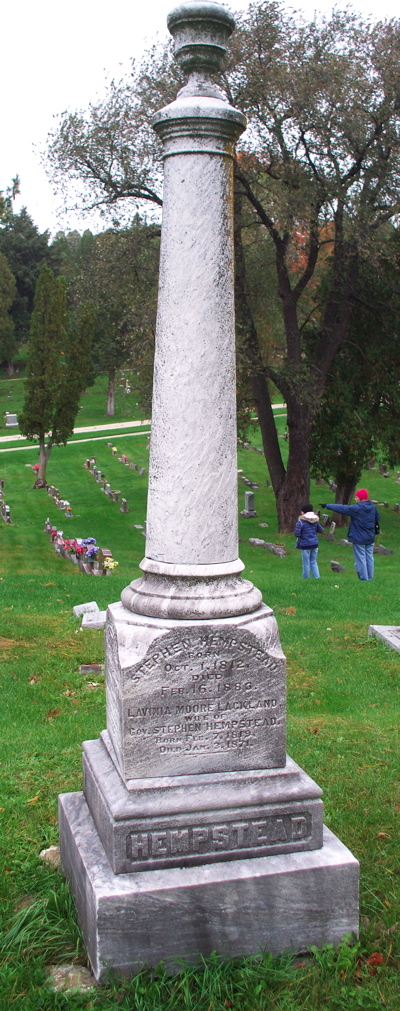Encyclopedia Dubuque
"Encyclopedia Dubuque is the online authority for all things Dubuque, written by the people who know the city best.”
Marshall Cohen—researcher and producer, CNN
Affiliated with the Local History Network of the State Historical Society of Iowa, and the Iowa Museum Association.
HEMPSTEAD, Stephen
HEMPSTEAD, Stephen. (New London, CT, Oct. 1, 1812-Dubuque, IA, Feb. 16, 1883). Governor of Iowa. Hempstead, Dubuque's first attorney, was elected with General Warner LEWIS to represent the northern portion of Iowa Territory in the Legislative Council which met in Burlington in 1838. He chaired the Judiciary Committee and the Committee on Incorporations. Re-elected in 1839, he became president of the Legislative Council.
In 1844 Hempstead was elected as a delegate to the constitutional convention that produced a constitution that was later rejected by popular vote. At one point in the convention, Hempstead presented a minority report forbidding banks. He lost that issue, but was re-elected the following year to the Legislative Council where he again chaired the same two committees. He was elected to the Council again in 1846 and served as its president. In 1848 Hempstead was appointed one of three commissioners to write a code of Iowa law. Their report was largely adopted in 1851.
Hempstead ran as the Democratic candidate for governor in 1850 and was elected governor. His term of office occurred at a time of rapidly increasing population. He worked to increase the population even more by suggesting the position of Commissioner of Emigration in New York to encourage more migration to Iowa. The Iowa House of Representatives, however, rejected the idea. He tried again in 1854 with no success. The Iowa Legislature, however, did approve of his idea of establishing the Office of Attorney General.
The issue of temperance also arose. At the time, the only restriction on liquor sales was that it could not be consumed on the premises where it was sold. In 1852-1853 supporters pushed prohibition in the state. Hempstead suggested "a judicious license system under the control of local authorities." The legislature took no action.
Other issues confronting the governor included banking. The Iowa Constitution of 1846 prohibited banks and twice the governor vetoed legislation to call a convention to amend the constitution to permit them. He did support "an asylum for lunatics." Sioux Indians signed a treaty in 1851 giving up the rest of their land claims in Iowa and 46 new counties were formed.
Hempstead ran for the United States Congress in 1854 but lost. In 1855 he was elected a Dubuque County judge, a position he held twelve years until the office was abolished. He then served as a county auditor until retiring in 1873 due to ill health. Hempstead is remembered in Dubuque with the naming of STEPHEN HEMPSTEAD HIGH SCHOOL.
---
Source:
Hudson, David; Bergman, Marvin; Horton, Loren. The Biographical Dictionary of Iowa. Iowa City: University of Iowa Press, 2008



